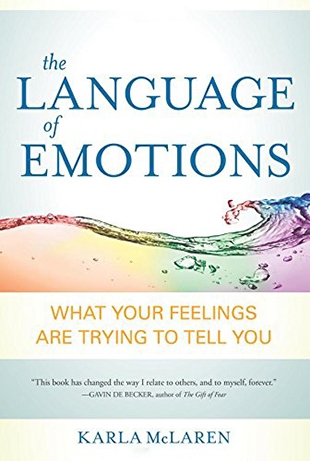Most of us are used to having an adversarial relationship with our difficult emotions such as anger, fear, confusion, panic and terror, sadness, depression, etc. At the same time, we can grow very attached to pleasant emotions such as happiness, contentment, and joy. In this bold paperback, Karla McLaren suggests that we see all our emotions as enlightening messengers and spiritual teachers who can open us to new possibilities. The award-winning author is a pioneering educator whose unconventional approach to emotions has taken her through the healing of her own childhood trauma into an empathetic-healing career and the study of sociology, neurology, cognitive psychology, and social psychology. McLaren is the author of five books and six audio courses on self-healing.
The author writes at the outset: "Our current understanding of emotion lags far behind our understanding of nearly every other aspect of life. We can chart the universe and split the atom, but we can't seem to understand or manage our natural emotional reactions to provoking situations. We work with nutrition and exercise to increase our energy, but we ignore the richest source of energy we possess — our emotions. We are intellectually brilliant, physically resourceful, spiritually imaginative, but emotionally underdeveloped. This is a shame because emotions contain indispensable vitality that can be channeled toward self-knowledge, interpersonal awareness, and profound healing."
All of us are born empaths (capable of reading emotions) but we are taught early in our lives to hide, stifle, or camouflage our emotions in social situations. For McLaren, these personal resources are part of our psyche, our neural network, our socialization, and our humanity. Empathetic work enables us to tread the middle ground between vilifying and glorifying our emotions. When we are adrift on a sea of troubles many of us turn to the distractions of avoidance and addiction. McLaren shares five empathetic skills which can help us navigate through tough times and trauma:
• Grounding Yourself
• Defining Your Boundaries
• Burning Contracts
• Conscious Complaining
• Rejuvenating Yourself
In the second half of the book, the author explains how many difficult emotions can be turned around and made into practical tools that can enrich and enhance our relationships, work, and personal search for meaning. Some of those covered are anger (protection and restoration), hatred (the profound mirror), fear (intuition and action), jealousy and envy (relational radar), and depression (ingenious stagnation). In the last chapter, "Emotions Are Your Native Language," McLaren speaks directly to us:
"You are also a living shrine — to consciousness, empathy, and flow. You should tend to yourself as a shrine and support your balance and agility with activities that bring all parts of you into play. Make time for art and music, feeling and thinking, relaxing and daydreaming, reading and study, exercise and dance, sensuality and comfort, rest and sound sleep, work and intensity, and plenty of laughter and play. Honor your multiple intelligences, your physical sensations, your spiritual visions, your emotional realities (and you need to complain!), and the village inside you. You are an irreplaceable living shrine through which emotions, thoughts, sensations, visions, dreams, and genius can flow into this world; you're an empath, a soul warrior, and a treasure."
